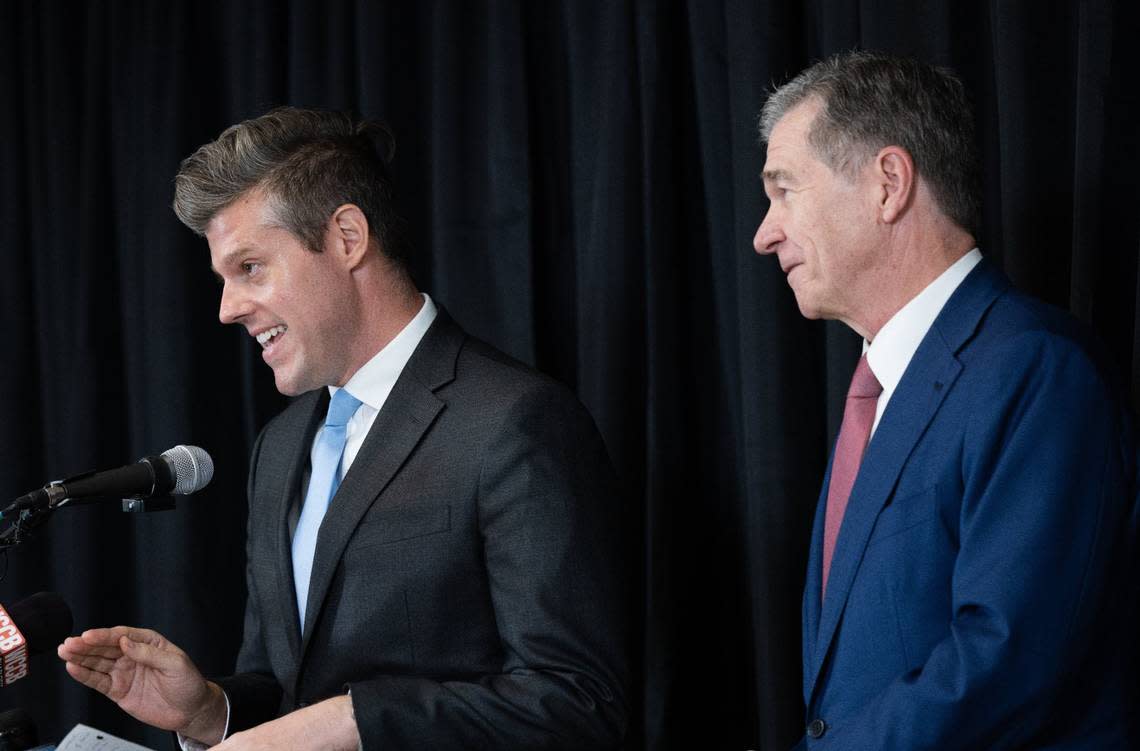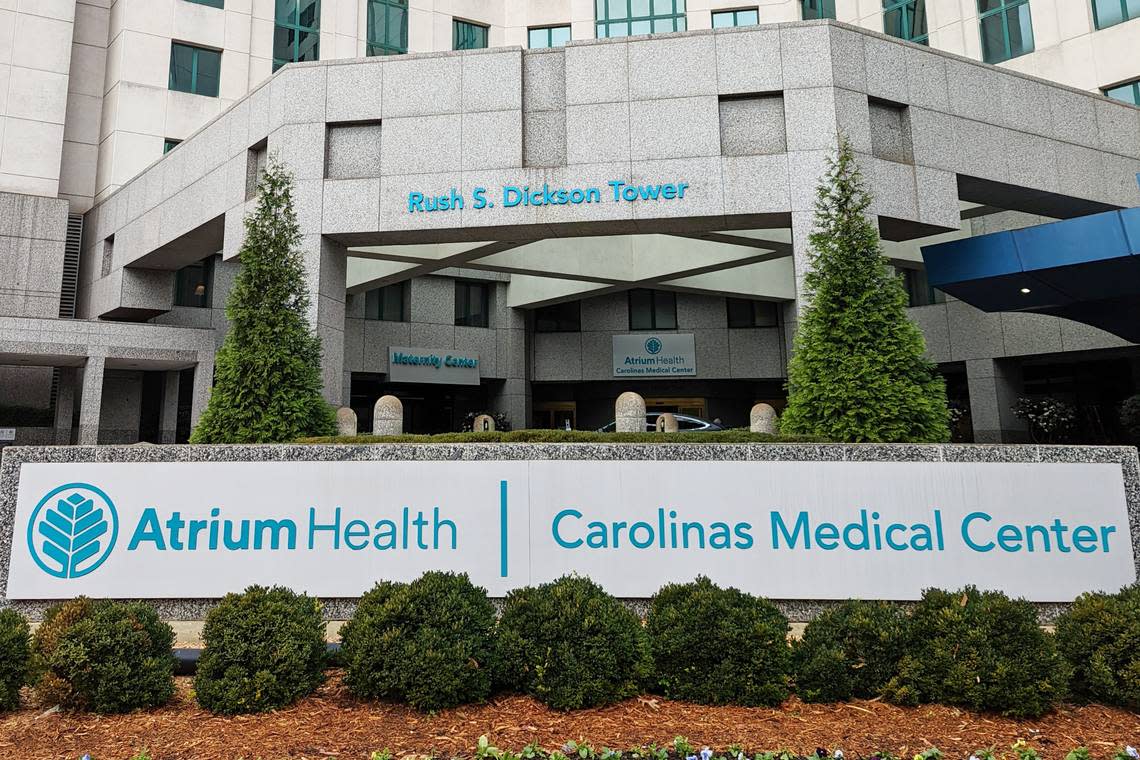Most NC hospitals will join Gov. Cooper’s patient-debt relief program. What’s next?
Most of North Carolina’s hospitals have agreed to sign on to Gov. Roy Cooper’s plan to ease patient medical debt, a development that will likely bring financial help to hundreds of thousands of people.
More than 65 of the state’s 99 hospitals — including those owned by Atrium, Novant, UNC Health, Duke Health, WakeMed, Cone Health, ECU Health and Mission Health — have agreed to participate in the plan so far. Hospitals had until 5 pm Friday to join the program.
Cooper’s plan, which was approved by the U.S. Centers for Medicare and Medicaid Services in late July, has the potential to relieve $4 billion in existing hospital medical debt for people in the state, his office has said.
But it’s not a mandatory program so its reach is contingent on the number of hospitals that choose to participate.
Those that do agree to forgive medical debts would receive higher reimbursements for treatment of Medicaid patients.
At a news conference in Charlotte Wednesday, Cooper and state Department of Health and Human Services Secretary Kody Kinsley touted the plan, which they billed as a first-of-its-kind effort to ease medical debt that has harmed hundreds of thousands.
About 2 million North Carolinians are saddled with medical debt — a statewide load totaling about $4 billion, Cooper said.
“That large medical debt is a constant weight on many people, particularly when it goes to a judgment,” Cooper said. “Judgments can ruin credit. They can keep people from getting loans and credit cards and even jobs. It can drive people into bankruptcy. And one thing we’re seeing is that it also makes people avoid the preventive care that they need.”
Vice President Kamala Harris, the Democratic presidential nominee, has been “coordinating” with state officials on the medical debt plan, The Washington Post reported.
According to Cooper’s office, hospitals that participate in the program must implement the following to be eligible for enhanced payments offered under the plan:
▪ For those on Medicaid, eliminate all unpaid medical debt dating back to Jan. 1, 2014.
▪ Wipe away all unpaid medical debt that has become virtually impossible to collect dating back to Jan. 1, 2014, for people not enrolled in Medicaid whose income is at or below at least 350% of the federal poverty level (FPL) or whose total debt exceeds 5% of their annual income. A family of two at 350% of the FPL makes about $71,000 a year.
▪ Provide discounts on medical bills for people at or below 300% of the poverty level.
▪ Automatically enroll people into hospital financial assistance programs, known as charity care.
▪ Not sell medical debt of people below 300% of the poverty level to debt collectors.
▪ Not report debt covered by these policies to a credit reporting agency.
Patients of participating hospitals will not need to take any actions to benefit from medical debt relief, according to a news release issued by Cooper’s office.

Plan gets mixed reviews
It’s unclear whether the debt relief plan would continue under future administrations.
The state has applied for its implementation in state fiscal years 2024 and 2025, which run through June 2025, according to documents provided by DHHS.
This makes it likely future administrations would need to renew the plan. Vying for governor next year are Democratic Attorney General Josh Stein and Republican Lt. Gov. Mark Robinson.
Asked for his thoughts about the plan, Stein told The News & Observer and The Charlotte Observer that he would “proudly continue” it and explore other opportunities to reduce health care costs.
“Governor Cooper’s plan represents a rare opportunity to create a win-win by providing financial stability for hospitals and financial relief for North Carolinians, who are crippled by medical debt through no fault of their own,” Stein said through a spokesperson.
“This program is only possible thanks to Medicaid expansion, which my opponent opposes. He also wants to eliminate the Affordable Care Act and its protections for people with preexisting conditions.”
Robinson did not reply to a request for comment sent to his spokesperson. Robinson, prior to expansion, had said he didn’t think the state should expand Medicaid, The N&O reported.
The Charlotte Observer and N&O asked 15 hospitals and hospital systems for their thoughts about the debt relief plan. None agreed to do interviews, but some provided emailed responses.

Although Charlotte-based Atrium, the state’s largest hospital system, agreed to sign on to the debt-relief program, it has expressed concerns about the plan.
The policy could add to the struggles of rural hospitals, leave people with less incentive to get health insurance and drive up insurance premiums, system officials wrote in a letter to DHHS Secretary Kinsley Friday.
“While we recognize and appreciate the department’s good intentions to address the troubling impact medical debt has on patients and families, we are concerned it does not address the full picture of the root causes, and it could lead to unintended consequences,” Atrium’s letter said.
UNC Health, which is participating in the program, wrote through a spokesperson that “we’re proud to support the effort to reduce medical debt” and “anticipate the plan will help millions of patients across North Carolina.”
The system said it would “take more time for us to calculate the potential financial impact and to implement the policy.”
Duke Health, which is also participating, said it had not fully assessed the financial implications of the plan but said in a statement:
“Duke Health believes that health systems, insurers, state, and federal programs all play important roles in ensuring access to health care coverage, access to care, and financial assistance and support for the most vulnerable in our community.”
A spokesperson for ECU Health also responded by email, stating that the system serves a disproportionate number of patients who rely on Medicaid and Medicare, and that it provides more than $200 million in uncompensated care annually.
“To ensure the sustainability of our mission-driven work, ECU Health closely partners with NCDHHS and other state leaders, and we believe the medical debt relief plan is in the best interest of the people we serve and have agreed to participate,” the spokesperson wrote.
At Novant, which also agreed to participate in the plan, financial assistance policies are aimed at ensuring “all have access to the vital care they need and deserve, regardless of their ability to pay,” a spokesperson wrote in an email.
How the plan will work
In state fiscal year 2024, payments to hospitals that agree to reduce or eliminate debt will be approximately 27% higher than they would be otherwise, according to a DHHS spokesperson. In 2025, payments will be 92% higher for hospitals that opt in. The initial payments would be made in September, according to DHHS.
These enhanced payments come through what’s called the Healthcare Access and Stabilization Program, or HASP. That program allows hospitals to receive higher federal reimbursements in return for paying the state’s share of costs under Medicaid expansion, which took effect in December.
The state pays 10% of Medicaid coverage costs for the expansion population, while the federal government covers the rest.
The state’s medical debt plan provides higher HASP payments to hospitals that choose to participate. Those payments will vary depending on the type of hospital.
By Jan. 1, 2025, patients will automatically qualify for charity care if they are already enrolled in a public benefit program, are experiencing homelessness, or are enrolled in Medicaid, according to the DHHS spokesperson.
Under the state’s plan, hospitals have until Oct. 1 to begin working on past medical debt. DHHS is partnering with Undue Medical Debt, an organization that buys and retires medical debt, to identify patients who are eligible for relief.
It will take up to two years for all eligible debt to be retired, according to DHHS.
By July 1, 2025, participating hospitals will need to forgive the past debt of individuals currently enrolled in Medicaid and curb aggressive debt collection practices. Medical debt from participating hospitals will no longer affect credit ratings by July 1, 2025, DHHS said.
A hospital ‘bailout’?
A 2012 investigation by The Charlotte Observer and N&O found that nonprofit hospitals in North Carolina were often straying from their charitable missions.
Although they were getting billions in tax breaks, many nonprofit hospitals were returning relatively little to the public in the form of charity care and other community benefits. Some, including Atrium, were suing thousands of patients who didn’t pay bills.
Atrium subsequently reduced the number of lawsuits it filed, and in 2022, the hospital system stopped the practice of suing patients altogether.
The newspapers’ investigation also found hospitals here were paying many of their executives millions, and inflating prices on drugs and procedures, sometimes as much as 10 times over cost.
State Treasurer Dale Folwell, a vigorous critic of nonprofit hospitals, has in recent years released a series of reports that have come to similar conclusions.
In an interview Friday, Folwell said he’s concerned that the debt-relief program will do little to address longstanding problems, such as inflated hospital bills and aggressive collections practices.
“If hospitals were doing all the things they were supposed to do, there would be very little need for this program,” Folwell said. “It’s a bailout. Why should taxpayers continue to subsidize them for the things they’ve done wrong?”
At Wednesday’s news conference, Kinsley said no additional state tax dollars would be required.
North Carolina Senate leader Phil Berger called Gov. Cooper’s plan “rushed” and “political,” arguing that the legislature was better equipped to handle the problems. The Senate unanimously passed a measure called the Medical Debt De-Weaponization Act last year, but the legislation died in a House committee.
“With the governor’s program, we don’t know the tax implications, the enforcement methods, or more importantly how a rural hospital that survives on a month-to-month basis is going to meet some of these immediate requirements,” Berger said in a statement emailed to the N&O.
NC Reality Check is an N&O and Observer series holding those in power accountable and shining a light on public issues that affect North Carolina.






